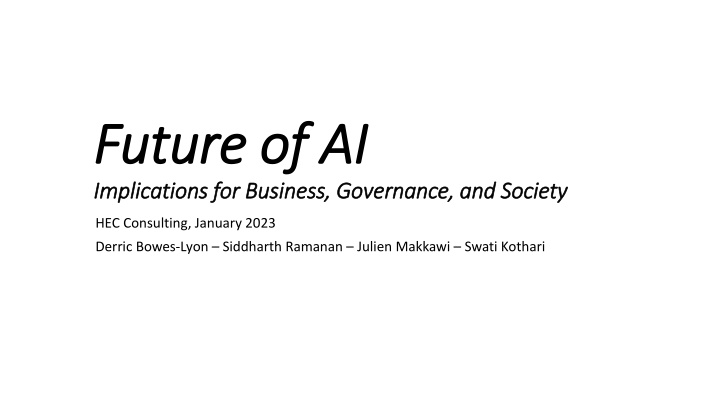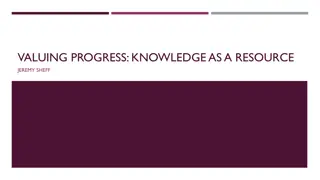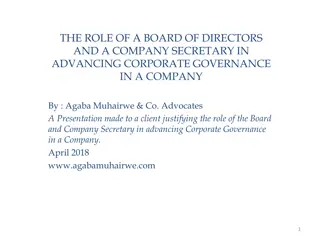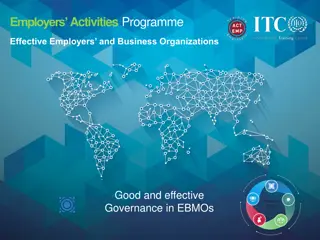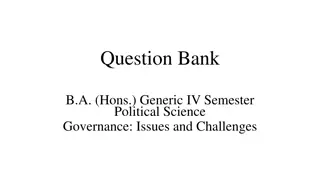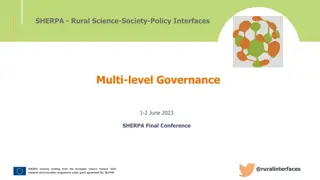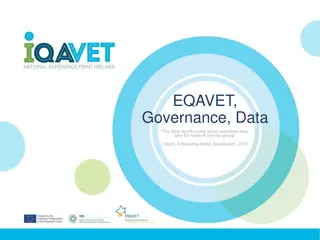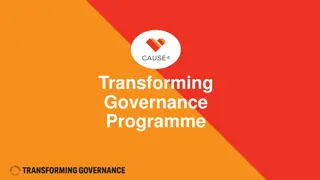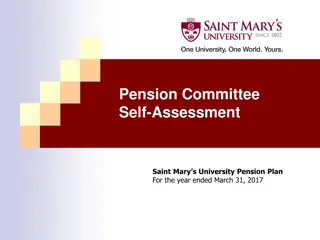Implications of AI on Business, Governance, and Society
Artificial Intelligence (AI) is poised to revolutionize various sectors, offering opportunities in healthcare, decision-making, automation, and skill development. However, challenges such as accountability, privacy, and societal implications need to be addressed proactively through collaborative governance frameworks. This article explores the potential, challenges, and roles of stakeholders in harnessing the benefits of AI while mitigating risks.
Download Presentation

Please find below an Image/Link to download the presentation.
The content on the website is provided AS IS for your information and personal use only. It may not be sold, licensed, or shared on other websites without obtaining consent from the author.If you encounter any issues during the download, it is possible that the publisher has removed the file from their server.
You are allowed to download the files provided on this website for personal or commercial use, subject to the condition that they are used lawfully. All files are the property of their respective owners.
The content on the website is provided AS IS for your information and personal use only. It may not be sold, licensed, or shared on other websites without obtaining consent from the author.
E N D
Presentation Transcript
Future of AI Future of AI Implications for Business, Governance, and Society Implications for Business, Governance, and Society HEC Consulting, January 2023 Derric Bowes-Lyon Siddharth Ramanan Julien Makkawi Swati Kothari
3 Introduction Introduction Background Artificial Intelligence new technology, advancing in an accelerating autocatalytic process. AI will potentially unleash a new wave technological revolution, with extreme productivity gains. Despite significant potential, there are significant concerns regarding its mass deployment stakeholders, employment, privacy. Recommendation Proactive approach to governance and governance frameworks, in a collaborative governmental organization, assembling various stakeholders Formation of AI Trade Body for best practices, consolidated reporting Agenda 1. Opportunities & Potential 2. Challenges 3. Role of Government 4. Stakeholders 5. Business Implications Introduction Opportunities Challenges Role of Gov Stakeholders Business
4 Opportunities & Potential Opportunities & Potential Opportunities: Immediate advances 1. Healthcare: AI could work as a predictive tool to help improve the quality of healthcare. CDL Montreal has numerous health-tech start-ups that serve in various levels of healthcare from scheduling to interpreting patient reports. 2. Process data and decisions from the past to make better decisions: AI could be used to process outcomes of decisions from decades that could help the machines make better and more informed decisions. 3. Continuous improvement: AI could improve its accuracy and make better decisions over time as it continuously collects information. For example, Osaro that automates the last mile warehouse management. 4. Better opportunities for manpower: As AI could take on routine tasks it creates opportunities for manpower to invest in better and high-skilled opportunities. Potential: Long-Term vision 1. Capabilities to undertake cognitive skills 2. Efficiencies and capability management 3. Governance and management 4. Sentience or Emotional capabilities Introduction Challenges Role of Gov Stakeholders Business Opportunities
5 Challenges Challenges Introduction Challenges Role of Gov Stakeholders Business Opportunities
6 Accountability Accountability AI application controlling every possible aspect of our life Surgeries Automotive Nuclear Fault goes to: Surgeon? Hospital? Machine? Fault goes to: Driver Company Machine? Fault goes to: Navy? Government? Machine?
7 Privacy Privacy AI bringing more tools & freedom People benefiting from these improvements Dependence behaviours Increasing implicit space taking on everyday life Everyday s life controlled by AI
8 Discrimination and bias Discrimination and bias High risk of over empowering entities with AI arbitrary / non holistic judgement Police Amazon Governments Facial recognition AI based apprehensions AI based candidate screening Corporate trust in machines AI based banishment Omnipotence of AI=government
9 Cognitive employment Cognitive employment High risk of human replacement Excutives Executives/AI Routine Machines Cognitive AI
10 Sentience Sentience Future challenges: - - - Machine emotional control threats (Skynet) Application ethical control threats (medical) Human replacement control threats
11 Regulation and Governance Regulation and Governance Bodies such as Industry Canada and Privacy Commissioner exist but don't fulfill the evolving regulatory needs Proactive regulation and consultation without stifling innovation Grant Program to small companies with innovative solutions and / or working on advancing ethical research or solutions Establishing a Technology Regulatory Committee Introduction Opportunities Challenges Role of Gov Stakeholders Business
12 Regulation and Governance Regulation and Governance Two options for the regulatory committee Permanent Committee Proactive option for continuous interaction and oversight Ad-hoc Committee Established on a need basis Stakeholder Committee Sub-committee to ensure regular interaction and consultation with key stakeholders on the subject Annual report on major industry trends and developments Also acts as a channel for updated knowledge on tech innovations Introduction Opportunities Challenges Role of Gov Stakeholders Business
13 Stakeholder Committee Composition Stakeholder Committee Composition 2 representatives from Permanent Committee (Chairperson, Dy. Chairperson) 3 representatives from AI businesses 1 from SMEs, 2 from Large Enterprises 2 representative from NGOs / Activists 2 Independent technology experts Introduction Opportunities Challenges Role of Gov Stakeholders Business
14 Stakeholders Stakeholders Customers Personal Data Employees Cognitive non-routine Workplace assistance Less employment opportunities Trade Unions Government National Security NGO Privacy, Human Rights Introduction Opportunities Challenges Role of Gov Stakeholders Business
15 Business Approach Business Approach Recommend proactive business approach Consistent reporting of: Export Technology Personal Data National Security Participation in new governmental stakeholder bodies Recommend the formation of an AI trade body to share information, best practices, and consolidated reporting to governmental bodies Introduction Opportunities Challenges Role of Gov Stakeholders Business
16 Conclusion Conclusion Opportunities VS Challenges Recommendation Proactive approach to governance and governance frameworks, in a collaborative governmental organization, assembling various stakeholders, and answering to Industry Canada. Trade body for best practices Conclusion
Discussion & Questions Discussion & Questions
